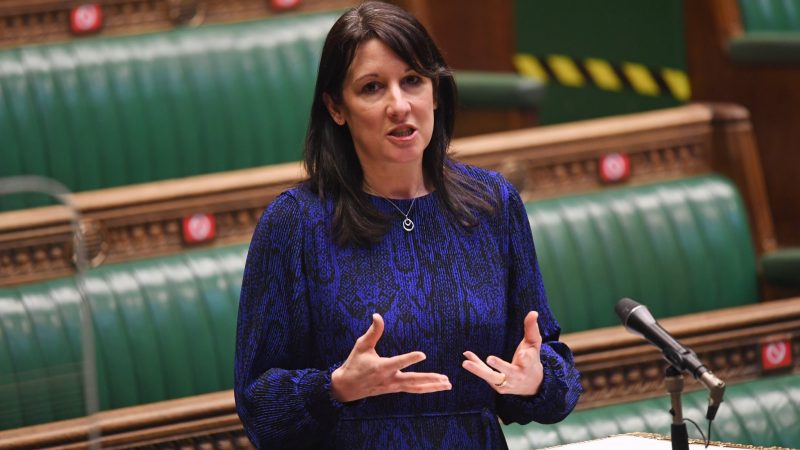
Rachel Reeves put some more flesh on the bones of Labour’s economic policies today. While we await Boris Johnson’s fate, she set out how Labour would govern differently. Economic policy is especially important for Labour, as the party often struggles to convince key voters it can be trusted to manage economy and the public finances, and so can’t get a hearing on other issues.
Optimism is the first notable change from previous Labour oppositions. In opposition, Labour often falls into the trap of leading any intervention with criticism of the Conservative government. To key voters, the sight of Labour politicians criticising Tory politicians is boring at best, and at work perceived as divisive, partisan and ‘doing down Britain’.
Now, though, Labour’s tone is optimistic and patriotic. It does not fall into the other trap of being utopian, fantastical or out of touch with reality. It simply champions current and previous achievements, highlights the vast potential out in the country and sets out ambitions to grow our economy by tapping into the ‘white heat’ of innovation.
This tees up the second major feature effectively: a comprehensive critique of Tory economic management that actually hits home. Labour’s case is that the Conservatives have failed to tap into the country’s resources, and have therefore presided over a “lost decade” of growth, which means they can’t fund public services and have to tax workers more. In turn, that too will be a drag on growth. The National Insurance hike is one clear example. This is a notable and important reversal of the argument that the Conservatives often deploy in general elections: that only the Conservatives can grow the economy in order to fund public services.
Bolstering that case, Reeves deploys another powerful critique: value for money. Fiscal credibility is a tough subject for Labour. The instincts of the party are, rightly, to help people. Helping people often costs money. The problem is, key voters know Labour’s instincts, and are put off by any whiff of losing control of the public finances, largesse at the taxpayers’ expense, or the debt that big spending implies.
So, how to win elections? Thankfully, the Tories have left an open goal. Since Keir Starmer became leader, Labour has been exposing their cronyism and linking it to wasted taxpayer money. This has now come good. The government has written off an eye-watering £4.3bn of fraud in Covid contracts, and at the Fabians’ new year conference, Reeves’ most popular line was simply: “we want our money back”.
At the same time, Labour has resisted calls to make many major spending commitments. The climate investment pledge is the one exception, but this should land far better, because it was laid on a foundation of fiscal credibility and was presented as preventing future, larger costs. Economic security, not transformation, now takes centre stage. This is a change in tone (rather than action), moving from the excitable way people on the left like to talk about the economy, to the way the public sees it every day.
Finally, this shadow cabinet is notably proud of Labour’s record in government – both now, and historically. Labour must show it can govern and deliver, to mitigate the Conservatives’ incumbency: the likes of Andy Burnham and Tracey Brabin are therefore key figures, as is acknowledging the 1997-2010 successes. Labour hasn’t been able to do either of these things for the last ten years.
So, having done the important work of positioning, where is Reeves’ policy ‘red meat’? Considering where we are in the political cycle, and after a significant ideological shift since 2019, it’s actually in quite a healthy state.
Reeves’ signature ‘everyday economy’ pitch has been several years in development (including in a 2019 Fabian pamphlet). In short, it means improving work and productivity in sectors like retail, hospitality and social care – hence Labour’s employment rights package. But it also means improving the everyday experience all people have of the economy: it’s a way of grounding economic policy in people’s lives, rather than talking in abstractions, and it has appeal far beyond the sectors to which it directly applies. As Reeves said today: “Millions work in it… And we all rely on it.”
There is one clear political priority now: regional policy. Regional economies and local infrastructure always play a significant part in elections – even when it’s less explicitly stated than with ‘levelling up’. At the next election, this will be even more important, regardless of who leads the Conservatives.
As a matter of urgency, Labour must work with local leaders to combine regional and industrial policies, drawing in R&D funding and climate investment pledge. Most importantly, they should work up an offer of real devolved economic power within England.
For Labour, winning an election with a good set of economic policies is always an uphill battle. But so far, the party seems to be on the right track.




More from LabourList
Almost half of Labour members oppose plans to restrict jury trials, poll finds
‘How Labour can finally fix Britain’s 5G problem’
‘The University of the Air – celebrating 60 years of Harold Wilson and Jennie Lee’s vision’